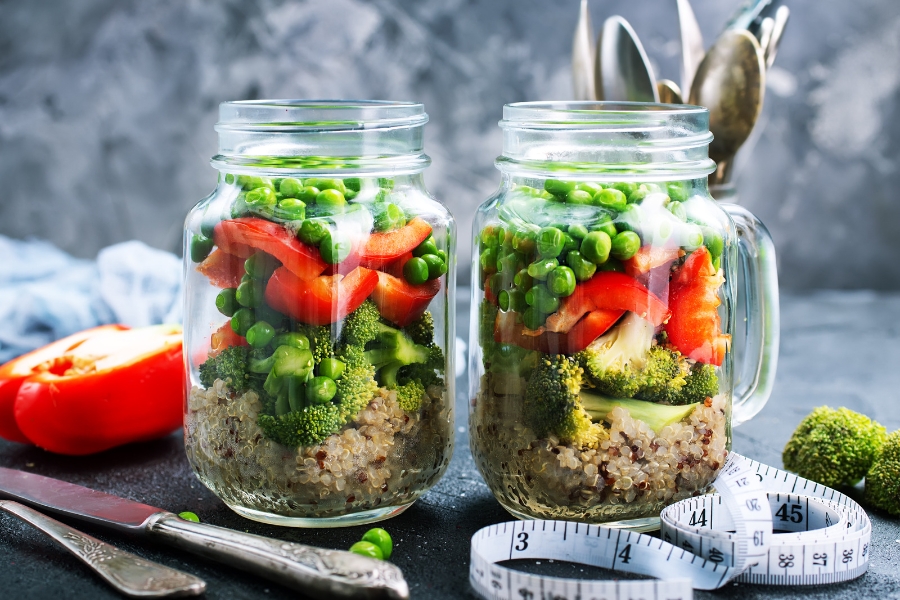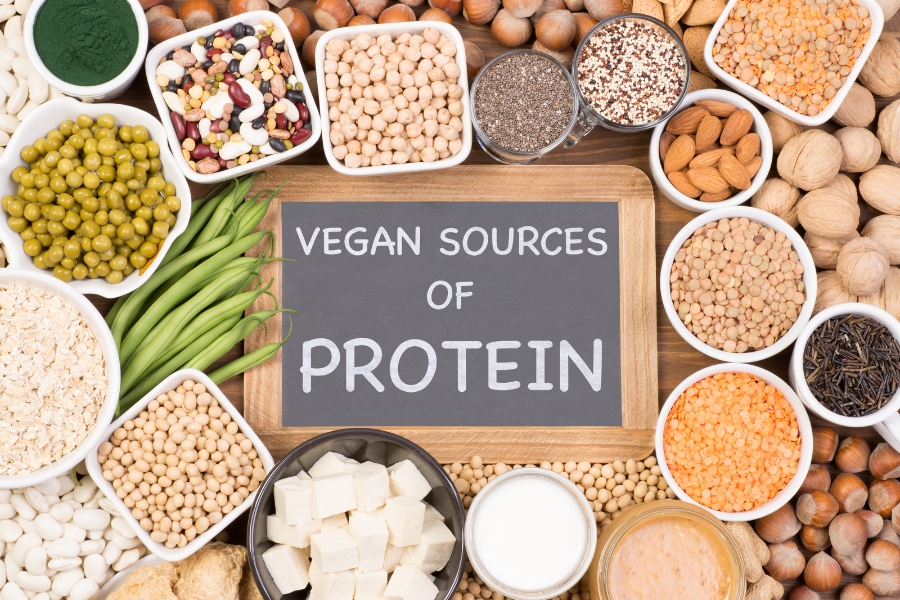
Browse our fun-packed, helpful plant-based articles, and delve deeper into this healthy, sustainable lifestyle!




Breaking Free from Comfort Eating: A Plant-Based Revolution
Plant-Based Weight Loss For Women
Author: Plant-Based Susy
Do you turn to unhealthy and greasy foods when you're sad? Does it ever actually make you feel better? How often do you let your feelings determine when and what you eat? It's okay if you're unhappy with your answers to these questions because things don't have to stay that way.
Intense food cravings might hit when you are going through a hard time or experiencing feelings of anxiousness. Sweet and fatty treats are typically the foods people turn to when eating to cope with emotions. This can ruin any hard work you've put into losing weight.
Using food to make yourself feel better is a common issue. Food is excellent, and it makes sense that you would want to turn to delicious treats to put a smile back on your face, but this isn't the healthiest habit.
The bright side is that you don't have to be stuck in comfort eating for the rest of your life. There are ways to break this habit and regain your power. Control of your eating habits will help you stick to your body goals and feel better overall.

Table of Contents:
What is comfort eating or emotional eating?
Comfort eating happens during times of stress and boredom. You may turn to food for comfort, whether consciously or unconsciously. Usually, during these moments of emotional eating, you overeat and reach for high-calorie foods.
For many people, there's a connection between how they feel and what they eat. A study from the American Psychological Association found that 38% of adults eat unhealthy foods as a way to cope with stress, often overindulging in the process.
Intuitive and mindful eating, where people listen to their bodies and feelings of hunger to determine when and how much they eat, is the best way to consume food. While eating three times a day and spacing out meals is great, we shouldn't let our emotions determine our eating habits.

How can mood affect eating habits and weight gain?
If you're an emotional eater, it's not entirely on you. There is a connection between stress and weight gain. When you're stressed, your body releases the hormone cortisol, which slows down physiological processes like your metabolism.
As the Cleveland Clinic explains, when this hormone is released, our immune system is suppressed, and our blood pressure and insulin production rise. When blood sugar drops, insulin levels go up, which leads us to the warm embrace of fatty and sugary food cravings.
What causes comfort eating?
There are many reasons why we might turn to comfort eating, many of which are out of our control. If you're facing conflict at work or home, you may turn to food to get through it. If you're depressed, tired, or even just bored, this can happen, too.
Potential causes of comfort eating:
Feelings of anger
Being lonely
Stress
Boredom
Finances
Fatigue
Work
Relationship problems
Major life events
We can be so used to turning to food to cope that we don't even realize we're doing it. The stressors that cause comfort eating are often things we don't have control over. Stress is a part of life, and it affects everyone.
Symptoms of stress:
Mood swings
Fatigue
Poor digestion
Anxiety
Panic attacks
Headaches
Weight loss or weight gain
Poor sleep
Here are some helpful tips to stop comfort eating
Giving up comfort eating is easier said than done. Once you've decided enough is enough, it will take time to form new habits and get used to saying no to comfort eating. Here are some tips to help you navigate this change.

Write down what you eat in a food diary
One of the best habits to adopt when trying to stop comfort eating is to track your eating habits. You can write down what you eat, how much, when, and even your mood. Keeping track of all of this information in one place will help you identify any patterns in your life that are causing you to overeat.
Food diaries look different for everyone. You can keep track of this information in your phone's notes app or write it down in an actual journal—whatever works best for you!
If you think tracking your food will not benefit you and maybe even do more harm than good, skip this tip. It's not worth spiralling and having negative thoughts. But this is an excellent tool if you can be stronger than your mind.
Pick up new ways to cope with stress
Tons of stress management techniques can be used instead of turning to food. For example, some people use yoga and meditation as a way to cope with stress. Finding a new strategy that works for you is a great idea because you can implement it when you're feeling down instead.
Stress management techniques:
Mediate
Try yoga
Exercise
Go for a walk
Talk with a friend
Read
Journal
Get a massage
Clean your space
Practice deep breathing
Try using essential oils
Change the snacks you have at home
Next time you're at the grocery store, skip the candy and chips and try reaching for healthier snacks like fruits, vegetables, and nuts. There are plenty of healthier options out there to have on hand, which removes the temptation. Keeping junk food out of your home and avoiding trips to the store when you're stressed or sad can make a huge difference.

Don't limit yourself too much
If you eliminate foods that aren't beneficial and force yourself to eat only nutritionally dense meals all the time, you're more likely to give in to your cravings when they hit. Don't wholly remove tasty treats from your life; have them less often.
Find something else to do when you get bored
Stop eating when you're bored. Instead, find something else to do with your time. Pick a new hobby or return to one you haven't touched. Read a book or watch a movie. Enjoy a spa day at home or try a workout video. Whatever you enjoy is excellent for fighting boredom, but stop treating food like it's the only option.
Hang in there if you have an off day
If you end up giving in to comfort eating, it's okay. It happens, and tomorrow is a new day. Use this as a chance to learn. What led you to comfort eat? What could you do differently to not let it happen again? This may look like switching out the foods you have on hand or picking up a new coping mechanism. Don’t give up!
Don’t be afraid to seek professional help
If these tips don’t work for you, and you still find yourself comfort eating often, it might be time to speak with a professional. They can help you understand yourself and determine what leads you to the kitchen when stressed. Therapy can help you get through comfort eating if you’re struggling on your own, and there’s no shame in it.

Frequently Asked Questions
When should you consider seeking professional help for comfort eating?
Sometimes, our desire for comfort eating outweighs our willpower, and that's understandable. If you've tried to control your comfort eating and it hasn't worked for you, there are professionals out there eager and willing to help.
A mental health professional can set you up with the proper process for you. There are therapies designed to help you find answers to why your eating habits are the way they are. Comfort eating can also be a sign of an eating disorder, which is a hard thing to navigate alone. If that sounds like you, seeking professional help might be best.
Can restricting food help with comfort eating?
Restricting food does not always help with comfort eating. The root of comfort eating tends to be an emotional issue. You're not comfort eating strictly because you lack self-control. A lot of it has to do with a stressor or a life event out of your hands. It will be easier for you to find success in ditching comfort eating if you try to deal with the emotional problems in your life as well.
Food is fantastic, and we're only human. It's natural for people to turn to a tasty bite to eat to try and mend their hearts. When you find yourself comfort eating, try to pinpoint why you're doing it. What are you feeling that is leading you to deal with your problem with food? Taking a step back at this moment, even if you've already eaten the food, can help you break free from this habit.
Why is less healthy food more comforting?
As Healthline explains, consuming comforting, high-calorie foods activates the reward center in the brain. Eating unhealthy foods during emotional stress may temporarily relieve some discomfort, but ultimately, it can cause us to associate unhealthy foods with stress relief.
It is also possible you’re hanging onto childhood memories too tightly. Maybe you have a family member who cooked for you when you were sad or offered you a slice of cake to put a smile on your face. These are nice gestures, but we can carry them into adulthood and not know where to draw the line. If you turned to candy and sweet treats to make yourself feel better when you were younger, you might be stuck in a loop, continuing to use them as a tool.
Where do food cravings come from?
There are quite a few reasons for cravings. A common reason is depriving yourself of good food. If you restrict your food too much or follow an extreme diet, or eat too much junk food, you're likely to be hit with cravings. Poor sleep, strong feelings, and an unsupportive social environment can also lead to cravings.
What can be more comforting than food?
Food can be comforting, and it's fine to indulge every now and then. However, if you're giving into comfort eating often, you may want to find other ways to comfort yourself. Try reading a book, walking, watching a movie, hanging out with your friends, calling a family member, playing with your pet, or listening to music.
It's up to you to find what comforts you. Try a few different hobbies until you find what's right for you.
What is the connection between food and mental health?
As the National Institute of Health explains, nutritional deficiencies can cause symptoms of depression and dementia. These symptoms include being irritated easily, low mood, tiredness, and cognitive decline. Vitamins like zinc, B12, and B9 are some of those lacking nutrients.
Eating processed foods can harm brain function and mess with your emotions. The foods we choose to eat directly impact our mental health. Eating more fruits and vegetables positively impacts psychological health.
Eating nutritionally dense foods is essential to staying healthy and caring for yourself inside and out. A healthy diet gives your body the necessary vitamins and minerals to run at its best.
The Bottom Line
Comfort eating is a common issue. It can sabotage your weight loss success and leave you feeling awful. Conquering this habit is within reach. Deciding it's time for a change is half the battle.
If you slip up and turn to food for comfort, don't dwell on it. Spending your time and energy judging yourself is not helpful. Instead, try to develop new habits for dealing with your emotions. When you're stressed out, try meditation or a long walk. If you're just bored, try reading or another hobby you enjoy.
Hang in there and put in the work to ditch the comfort-eating habit. It won't happen overnight, but you have the power to break free from this habit. It will take some time, and that's okay! Breaking the habit of comfort eating is a journey in self-love.

💚 "Happy Plant-Based Eating & Exercising!" 💚

Plant-Based Susy
Plant-Based Nutrition Professional & Weight Loss Coach
Empower Yourself: Embark on a Delicious Fat Loss Adventure



🍉 Get Ready to Jump Start Your Fitness Goals AND DISCOVER A HEALTHIER YOU!
🍉 Let's Make Your Fat Loss & Optimum Health Journey a Delicious Success Story!
🍉 Get The FREE Sustainable Weight Loss Companion eBook and CHEAT SHEETS!
More Free Resources
Unlock Your Transformation Today!
© 2025 VeganSusy Ltd. All Rights Reserved











Facebook
Instagram
Youtube
Pinterest